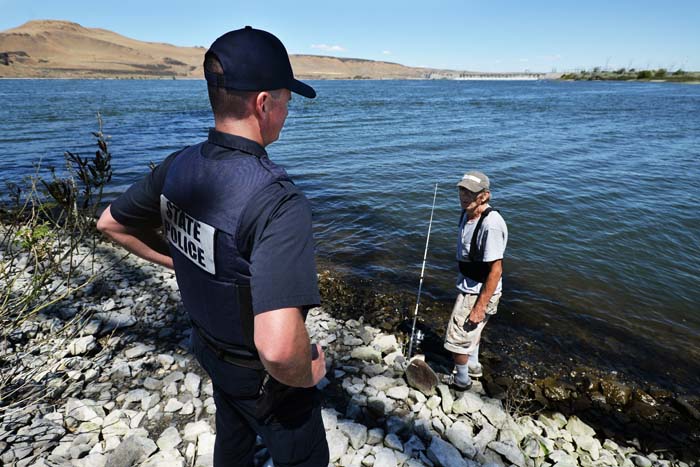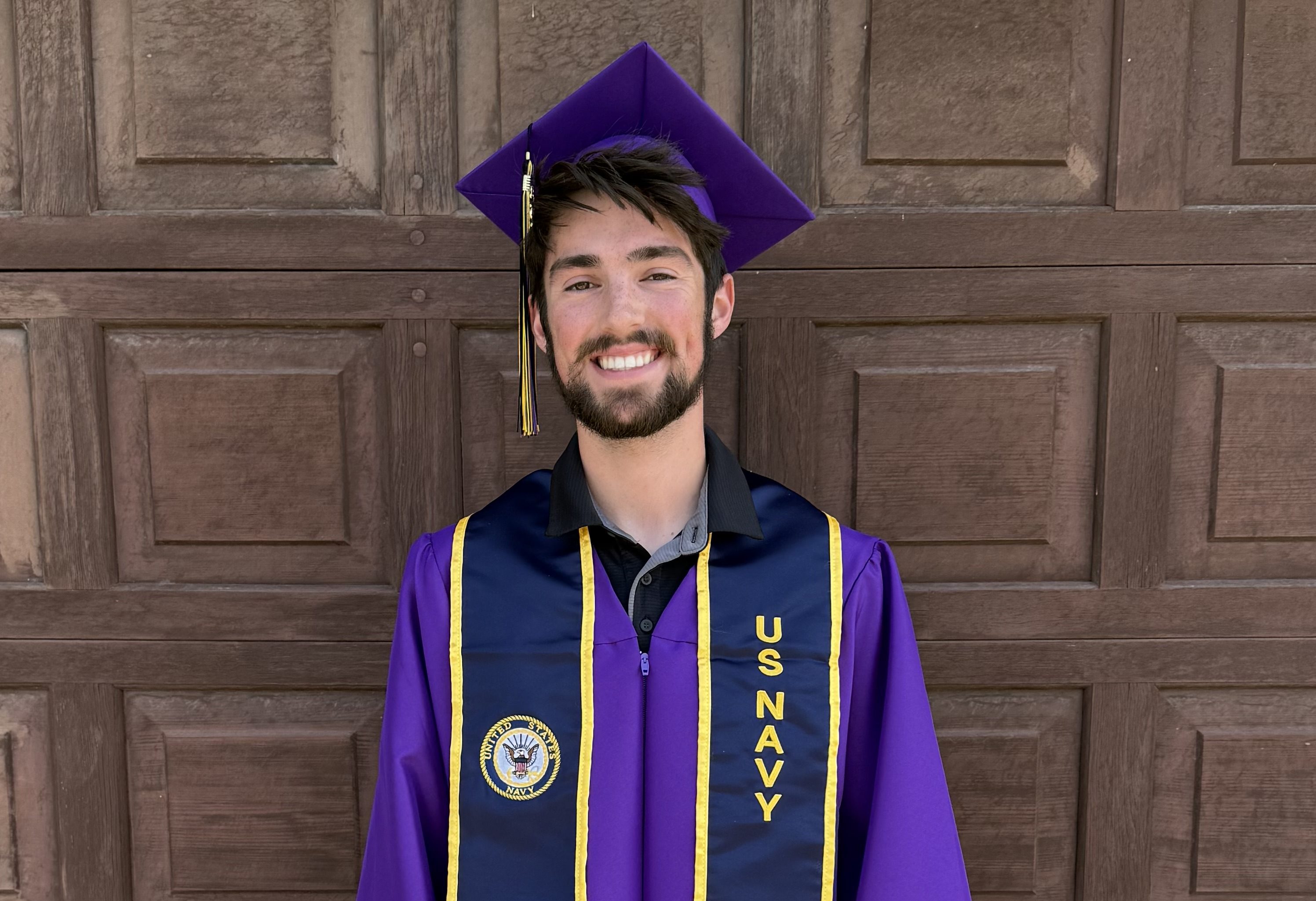Simplifying the hunt
Published 2:32 pm Tuesday, June 19, 2018

- Oregon State Police fish and wildlife trooper Ryan Sharp speaks with Randy Beehler as he fishes off a jetty near the Umatilla marina on the Columbia River. Sharp was patrolling the Columbia River on Thursday, checking anglers for compliance with state fish and game regulations.
Make them simpler. That’s the Oregon Department of Fish and Wildlife’s aim for big game regulations for the 2019 hunting season.
Hunters for years told the state agency its regulations were too complicated. They joked about needing a lawyer to understand them.
Nick Myatt said the department has heard those refrains. He’s the ODFW Grande Ronde watershed manager based in La Grande, and leading the team tasked with trimming them down.
“Regulations are often added and seldom removed,” Myatt said. “It takes an effort like this to look at the bigger picture that we’re providing to our customers, the hunters.”
ODFW about five years ago started simplifying fishing regulations, and that work is nearing its end with new rules for salmon and steelhead. But big game regulations, Myatt said, needed the biggest reworking.
Corum Delyria of Enterprise is on board with that. He said he hunts most everything he can, and he gets frustrated with the pile of state regulations.
“Honestly, there’s a lot of stuff in there that just should not be there,” he said.
Delyria doesn’t understand some equipment rules, such as hunts that allow him to use his .44 Magnum handgun with a 10 1/2 barrel but not a lever-action carbine rifle that fires the same round of ammunition.
He also thinks the state should change when and how it sells game tags. ODFW requires hunters to buy a license and pay for game tags. If the hunter does not draw the tag, they are out of luck. He said that should be the other way around.
“You put in for your tags and if you draw your tags, then you should not be able to buy the tags until you buy the license,” Delyria said.
Justin Buckley of Condon said he would like to see more useful hunting unit maps in the regulation handbooks.
“If you don’t grow up in it, you don’t know where such-and-such falls are,” he said. “If you don’t know the area like the back of our hand, you’re basically shooting in the dark.”
Buckley said he takes the regulations seriously and strives to understand and follow them so he is on the right side of the law.
Larry Moody of Pendleton said he has had to call ODFW for clarification on regulations. He, too, suggested better maps. Moody, like Buckley, said the description of boundaries are hard to understand when you plan your hunt.
Simplifying the regulations is complicated, Myatt said, and “a pretty heavy lift for us. And the problem wasn’t created overnight. It was many decades in the making.”
The team split work into three phases. The first was to focus on making the handbook more reader-friendly, from improving the organization to getting rid of redundancies.
“If there was something really important, we felt like we needed to say it over and over again in there,” he said.
That’s going away, along with the heavy use of legalese. Some regulations used the language of the state laws. In this year’s handbook, Myatt said the team collected everything related to youth hunting and collected them in a two-page section.
The team also added more maps and tables to present information.
“I feel like we got about 70 percent of the way there,” he said. “We have a lot more planned for the coming year.”
The second phase is happening now — reviewing the general hunting regs, weapon restrictions and youth programs. The team came up with 32 proposals, and Myatt last week in Baker City briefed the state Fish and Wildlife Commission about those. Some of the major change are:
• Standardize the minimum draw weight for bows at 40 pounds for all big game mammals.
• Eliminate the prohibition against decoys with moving parts when big game hunting
• Simplify requirements for legal muzzleloaders and make it clear sabots or saboted bullets are unlawful.
Two other proposals would require legislative approval. The first would limit leftover tag purchases to people who previously applied for a tag but did not draw. This would allow more people an opportunity to hunt each year.
The second would streamline limits on non-resident tags, capping those at 5 percent of all deer, elk, pronghorn, and bear controlled hunt tags.
The team reworded several regulations, including prohibiting rifle hunting without a valid deer or elk tag during certain periods and the proof of sex requirements. The team also culled regulations it deemed unnecessary or redundant.
For a full list of the proposals, visit https://bit.ly/2spD7KJ.
Myatt explained dropping the draw weight of a bow to 40 pounds from 50 would put Oregon in line with other states and remove a barrier to youth and smaller hunters. Besides, he said, the technology for archery equipment has advanced to where a 40-pound bow today delivers the same effect a 50-pound bow did years ago.
Delyria said he wants the state to allow mechanical broadheads for archery hunting, which deploy their blades in flight. He said there is plenty of evidence to show they make for faster kills.
Mechanical broadheads have drawn the most public comment, Myatt said, and the commission received a briefing on them. But they are not on the recommended list of changes for now. Myatt said there is no good evidence to show mechanical broadheads are more effective than traditional broadheads, particularly on larger game such as elk. For now, he said, Oregon remains one of two states in the lower 48 that prohibits them.
The last of the three phases, Myatt said, “is where we dig into the hunts themselves.” That means they will considering scheduling, size and shape.
Wyatt said the goal of simplifying and updating the regs is to entice more people to hunt in Oregon. The project does not touch on the cost of hunting, which was the top compliant from Delyria, Buckley and Moody.
The commission considers the final proposals when it meets Sept. 14 in Bandon. (Except for legislative concepts, which would go before state lawmakers in the 2019 legislative session.) Myatt said hunters and the rest of the public can come to testify or send comments to odfw.commission@state.or.us.
Oregon State Police Sgt. Tim Brown oversees fish and game troopers based in Pendleton. He said the revisions might not make the handbook any shorter, but likely easier to read. He was pragmatic about what it means on his end and for hunters.
“I don’t have an opinion one way or the other,” he said. “If it’s a rule, we’re going to enforce it.”





